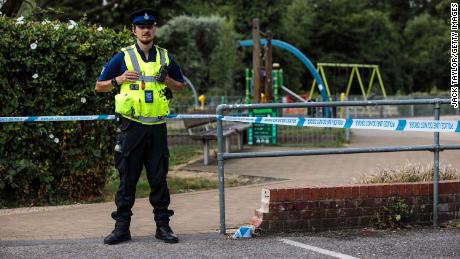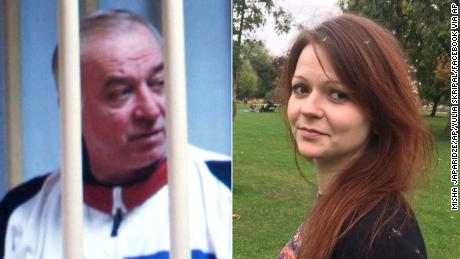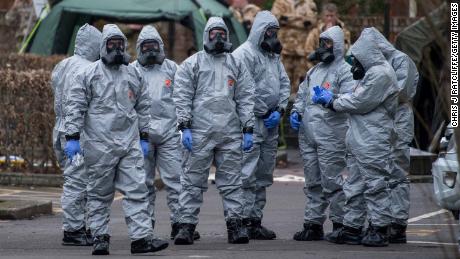(CNN)US President Donald Trump suggested on Tuesday that he believes the British government's theory that Russia was likely responsible for the nerve agent attack on a former Russian spy and his daughter in England earlier this month.
"It sounds to me like it would be Russia, based on all the evidence they have," Trump told reporters outside the White House. "It sounds to me like they believe it was Russia and I would certainly take that finding as fact."
Trump added: "As soon as we get the facts straight, if we agree with them, we will condemn Russia or whoever it may be."
Trump also said he would speak to UK Prime Minister Theresa May about the incident.
May said Monday that it was "highly likely" Russia was to blame for the attack, and demanded an explanation from Moscow by midnight Tuesday for how a "military-grade" nerve agent was used in the poisoning of Sergei Skripal, 66, and his daughter Yulia, 33.
UK authorities believe the pair were targeted with Novichok, a nerve agent developed in the Soviet Union in the 1970s. The Skripals were found slumped on a bench in the English city of Salisbury on March 4, and remain in critical condition.
Russian Foreign Minister Sergey Lavrov dismissed accusations of Russian involvement as "nonsense," state-run Tass reported. His office said Moscow would not respond to London's ultimatum without receiving a sample of the substance.
Also Tuesday, Russia's ambassador to the European Union told CNN that Britain might not be "such a safe place" for Russian nationals. Vladimir Chizhov also said the British government had "failed to provide Russia with detailed evidence and samples," which Chizhov said his country would need to "launch an investigation by our own experts."
Trump's remarks to reporters came on the heels of the news that he had fired US Secretary of State Rex Tillerson.
On Monday, Tillerson issued a harsh condemnation of Russia over the poisoning of Skripal. Tillerson's remarks went further than the White House's response earlier in the day, which had stopped short of pinning blame for the attack on Moscow.
Trump and Tillerson are not the only foreign figures to lend their support to the UK. French President Emmanuel Macron and German Foreign Minister Sigmar Gabriel have condemned the attack, while NATO Secretary General Jens Stoltenberg said the UK is a "highly valued ally" and the incident is of "great concern" to NATO.
Federica Mogherini, the EU's high representative for foreign affairs, described the attack as shocking and said the EU stands "with the UK in pursuit of justice."
Moscow: Threats of sanctions 'will not remain unanswered'
May said Monday that the Russian ambassador had been summoned to the UK Foreign Office to explain whether the attack was "a direct action by the Russian state," or the result of the Russian government "losing control" of its stock nerve agents.
Her combative stance was echoed by UK Foreign Secretary Boris Johnson, who described the incident as "a brazen attempt to murder innocent people."
"To the best of our knowledge, this is the first use of nerve agent on the continent of Europe since the Second World War and we want the Russians to give an account of what's been going on," Johnson said.
"If they can't, then clearly the UK government will come forward with measures, a response that is commensurate but robust."
Exactly how Britain might respond to evidence that implicated Moscow in the attack remains unclear. Possible options might include the expulsion of Russian diplomats and UK-based pro-Kremlin oligarchs, financial restrictions on figures linked to the Kremlin, and diplomatic efforts involving EU and US allies.
After mounting speculation that UK regulators could clamp down on broadcaster Russia Today, the company said it was "regrettable to see RT so quickly proposed to be sacrificed as a political pawn" and that "any curtailment of RT will ultimately be to the detriment of the British public."
The UK's National Security Council is scheduled to meet Wednesday to review any Russian response to May's speech.
On Tuesday, Lavrov accused the UK of denying a request from Russia to access the case materials, including samples of the substance used.
"In response to this absolutely lawful and logical request ... we received an unclear response, which can be summarized that these lawful requests were denied," Lavrov said.
The UK Foreign Office said it could not confirm whether such a request had been submitted.
In a statement, the Russian Foreign Ministry confirmed that Moscow would "not respond to London's ultimatum" until provided with samples of the substance.
It continued by saying "any threats of taking 'sanctions' measures against the Russian Federation will not remain unanswered. This must be understood by the British side."
In other developments, UK Ambassador to Russia Laurie Bristow was summoned to Moscow, according to a spokesperson for the Russian Foreign Ministry.
Investigation will last 'many weeks'
Skripal is believed to have lived in the UK since his release from Russian custody in 2010.
He was convicted in Russia of spying for Britain before he was granted refuge in the UK after a high-profile spy swap in 2010 between the United States and Russia.
Since he and his daughter were hospitalized on March 4, the usually quiet city of Salisbury, best known for its proximity to Stonehenge, has been a hub of activity.
About 180 military personnel were deployed to the city on Friday to help police amid concerns over potential contamination.
People who visited the Bishop's Mill pub and a branch of the Zizzi restaurant chain on the day of the incident are being urged to wash their clothes, and the two sites -- both visited by Skripal and Yulia on March 4, according to the Metropolitan Police -- remain cordoned off.
Neil Basu, assistant crime commissioner for counterterrorism, said 38 people had received medical attention because of possible exposure to the nerve agent.
Three of those remained hospitalized -- the Skripals and police officer Nick Bailey -- with one other person being monitored as an outpatient.
Basu also offered new details on the timeline of the incident, revealing that Yulia arrived in London on a flight from Moscow on March 3 and traveled with her father to Salisbury city center in a red BMW the next day, arriving around 1:40 p.m. They visited the pub and the restaurant before being found by police slumped on a bench near Zizzi soon after 4:15 p.m.
Basu said the investigation was complex and could last "many weeks," adding: "We will follow where the evidence leads."
Intelligence agency investigating 'suspicious' deaths
Meanwhile, UK Home Secretary Amber Rudd has asked police and intelligence agency MI5 to look into allegations of Russian state involvement in a number of deaths in the UK.
After the Salisbury incident, the chairwoman of the Home Affairs Select Committee, Yvette Cooper, wrote to the home secretary regarding a Buzzfeed report alleging Russian links to 14 suspicious deaths in the UK. Cooper asked for a review of such cases.
On Tuesday, Rudd wrote back to Cooper, stating, "I will want to satisfy myself that the allegations are nothing more than that. The police and MI5 agree and will assist in that endeavour."
























